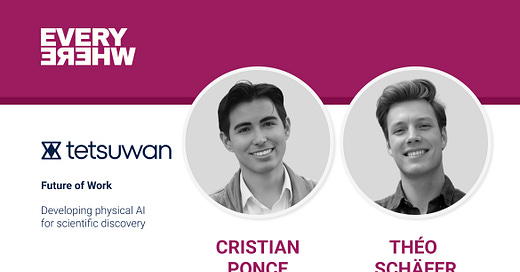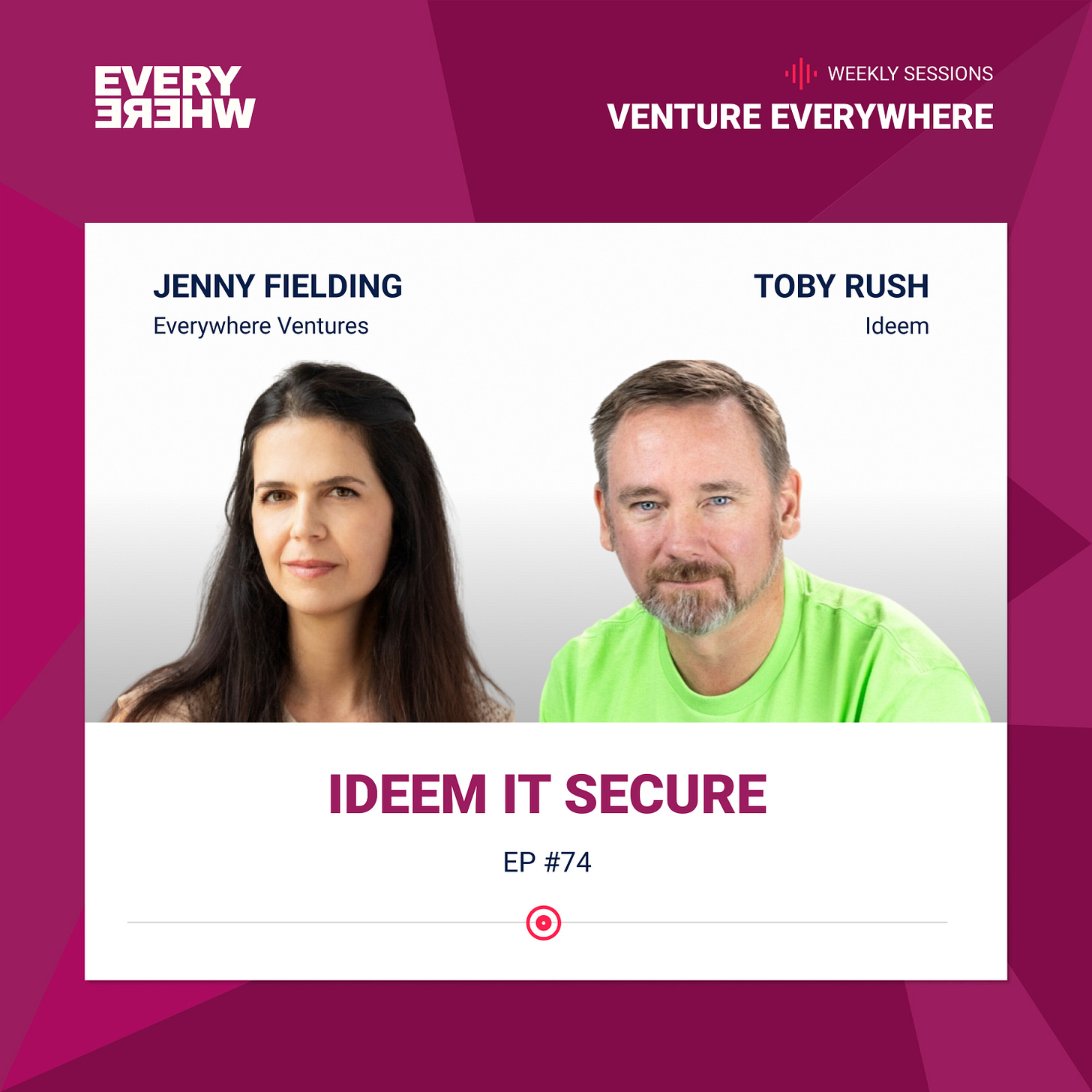Founders Everywhere: Cristian Ponce and Théo Schäfer
Cristian Ponce and Théo Schäfer are the co-founders of Tetsuwan, a startup developing physical AI for scientific discovery.
Welcome to Founders Everywhere, where we highlight the incredible people behind the companies we’ve backed at Everywhere Ventures, a global pre-seed fund supported by a community of 500 founders and operators.
The way scientists run experiments in labs has barely changed for decades. If you’ve ever taken a biology or chemistry class, you probably remember using a pipette—those slender, pen-like tools that let you carefully measure and transfer tiny amounts of liquid, drop by drop, with a steady hand and a lot of patience. This type of repetitive, manual work not only slows down research but also introduces errors and makes it hard to reproduce results. Tetsuwan is breaking the mold by combining AI with lab robots to develop autonomous platforms for life sciences research. By automating the most tedious parts of lab work, Tetsuwan’s technology frees up scientists to focus on creative problem-solving and big-picture discoveries.
Tetsuwan’s co-founders, Cristian Ponce, CEO, and Théo Schäfer, CTO, bring together a powerful combination of expertise in biological and mechanical engineering. Cristian has a background in bioengineering from Caltech, where he contributed to a minimal cell project. Théo has a master's degree in mechanical engineering and robotics from ETH Zurich and also conducted research at MIT. After graduating, he worked on various advanced robotics projects including designing autonomous underwater vehicles for space exploration at NASA's Jet Propulsion Lab. The two met through Entrepreneur First’s U.S. program. Initially, they thought their backgrounds didn’t overlap, but when Cristian explained the manual labor involved in life sciences research, Théo was surprised by the lack of automation. That’s when they realized their combined expertise could address a big problem in scientific discovery.
What’s Tetsuwan’s mission?
Our mission is to introduce a new paradigm of scientific discovery. We believe in a new science where research is as reproducible and scalable as modern computers. Just as you can share code and run it anywhere today, we envision a future where you can share experimental protocols globally and have them executed by robots without you ever having to step foot into a lab. This would let scientists focus on higher-level thinking, analysis, and innovation, rather than repetitive manual labor.
Why is Tetsuwan a “must-have” vs a “nice to have”?
A lot of people think automation is just about saving time or money, but the real value is reproducibility. Human scientists, no matter how skilled, introduce variability. Robots can execute experiments with a level of reproducibility that humans simply can’t match. Reproducibility is a must-have for the future of science.
Why is Tetsuwan going to win?
We’re solving the core problem that’s held lab automation back for decades. Although some of the hardware for lab automation has been around for years, adoption has been stalled because operating these robots requires specialists, automation engineers, and the setup process is tedious, error-prone, and very different from the way scientists naturally communicate. There’s no formal training or handbook for lab automation engineering; it’s a niche skill set learned on the job, and most scientists find it prohibitively hard to translate their experimental methods into the explicit instructions robots need. As a result, automation hasn’t become widespread, but that’s exactly what we’re determined to change.
Tell us about a recent milestone Tetsuwan crushed.
We’ve deployed our robots to two labs so far: one in San Diego working on rare disease gene therapeutics, and another in the Bay Area focused on skin microbiome engineering.
What have been some of your greatest challenges founding Tetsuwan?
The hardest part has been communicating some of our ideas. When we started in 2023, autonomous discovery was a fringe concept, especially using language models to interface with lab robots. The space is just now gaining traction, with big players and startups entering. Explaining why this niche, misunderstood role of the lab automation engineer is so critical to the future of scientific discovery is not always easy. Nonetheless, we remain confident that automating automation engineering is the biggest step we can take towards automating research. The industry hasn’t changed much in decades, so it’s a big shift in mindset.
Why the name Tetsuwan?
We watched a show when we were kids about a robot boy that helped to defend the world from threats. We wanted to develop robots that would do the same, so we decided to name it after this show from our childhood, Tetsuwan Atom, or Astro Boy in English.
Fun facts:
Cristian: I'm an adrenaline junkie and have gone skydiving and swimming with sharks.
Théo: I have a black belt in judo. I also have a YouTube channel in French about science and vulgarization.
Listen to Toby Rush with Jenny Fielding on the Venture Everywhere podcast: Ideem it Secure. Now on Apple & Spotify and check out all our past episodes here!




